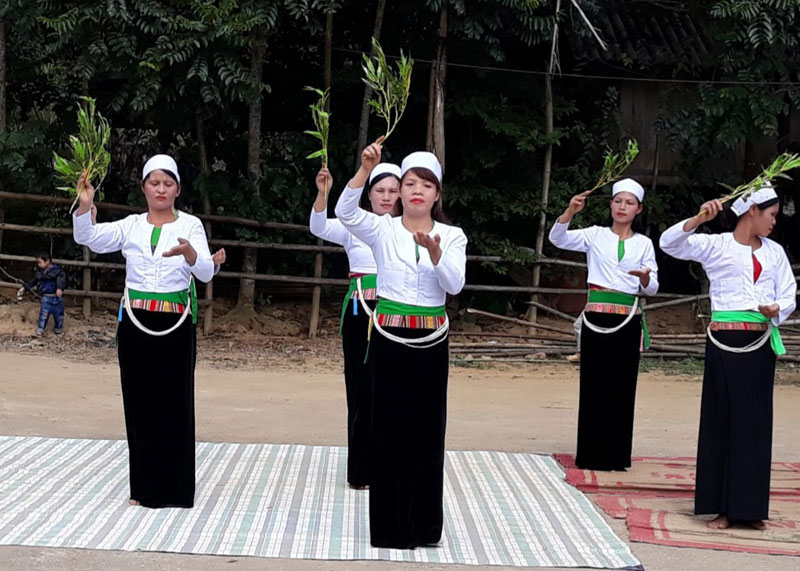
(HBO) - Mentioning Cao Phong district, tourists all over the country know that this is one of the four famous ancient Muong regions of the province, Bi is the first, Vang is the second, Thang is the third and Dong is the fourth. Muong Thang in Cao Phong has long been known as a land rich in traditional cultural identity. In the district there are beautiful and rich natural landscapes with many beauty spots containing the historical legends. This place also preserves the traditional beauty in the lifestyle, the customs, the house architecture of Muong community, promising to be an attractive destination.
 The performance
team of Tien hamlet, Thung Nai commune (Cao Phong) are practicing performances
imbued with the identity of Muong ethnic group to welcome tourists.
The performance
team of Tien hamlet, Thung Nai commune (Cao Phong) are practicing performances
imbued with the identity of Muong ethnic group to welcome tourists.
For the type of community tourism,
coming to Muong Thang land, tourists can visit the community tourism sites in
Muong Giang Mo village in Binh Thanh commune or Tien hamlet in Thung Nai
commune. In particular, Giang Mo village has long been attracting domestic and
international tourists. In the village there are more than 100 traditional
stilt houses that still remain the original identity of the houses and the
lifestyle of Muong ethnic people. In Mo village, visitors can visit the
historical relics of the heroic tank destroyer, the hero Cu Chinh Lan.
There is
a monument depicting the image of the intelligent and brave hero on the road 6,
which is associated with the glorious victory of our army and people in Hoa
Binh Historic Campaign. In spring, coming to Cao Phong, tourists often choose
the spiritual tourism destinations such as Thac Bo Temple in the tourism chains
of Hoa Binh lake area. Leaving Thac Bo Temple, we arrive in Khanh Pagoda (Yen
Thuong Commune). On the journey to Khanh pagoda, we can visit Quen Ang pagoda
in Tan Phong commune, a historical relic associated with the legend of "The
Flower Garden in Coi Mountain” - a story in Mo epic - Mo Muong in Hoa Binh.
This is also the area which the district has restored Muong Thang Festival at
the beginning of the year. In particular, the cave populations of Dau Rong
mountain in zone 3, Cao Phong town, which was granted the monument of the
national level by the Ministry of Culture, Sports and Tourism in 2012, is also
the focus chosen by many tourists on their journey to Cao Phong district.
With
a convenient area, which is about 500 meters from the National Road 6, a lot of
beautiful caves are linked together to form the populations such as the marble
Caves of Hoa Son, Khong Day cave, Nhan Long Mountain Cave, Phong Son Cave,
Water Cave and Thanh Thuy Cave. Along with the above tourism destinations,
coming to Cao Phong, visitors will immediately see a rich land of orange and
sugar cane gardens stretching like a green steppe.
Located just a 20-minute drive from Hoa Binh City, Ora Hill Farmstay & Glamping Hoa Binh is a captivating new destination nestled in Mo hamlet, Bình Thanh commune, Cao Phong district. Combining farming with leisure, this tranquil retreat is perfect for those seeking balance, joy, and an immersive experience in the expansive beauty of nature.
Muong Bi - Tan Lac is renowned as one of the four famous Muong regions in Hoa Binh province. Blessed by nature with a favourable climate and stunning landscapes, Tan Lac holds great advantages for tourism development. The local tourism industry has made remarkable strides in recent times thanks to the attention and support from the local authorities and sectors.
With its strategic location, well-developed transport network, and diverse soil and climatic conditions, Hoa Binh is emerging as a must-visit destination in Vietnam's northwestern tourism corridor. The province boasts numerous attractions, including the Kim Boi hot springs (Kim Boi district), the Dau Rong cave complex (Cao Phong), the Mai Chau valley (Mai Chau), and the iconic Hoa Binh hydropower plant.
The northern mountainous province of Hoa Binh has been listed among the 71 most beautiful places to visit worldwide by the prestigious US travel magazine Condé Nast Traveller.
Hoa Binh province’s rich natural and cultural resources position it as a prime location for developing community-based tourism (CBT). In recent years, support from central and provincial policies, as well as assistance from non-governmental organisations, have encouraged local ethnic minority and mountainous communities to actively engage in the sector.



 The performance
team of Tien hamlet, Thung Nai commune (Cao Phong) are practicing performances
imbued with the identity of Muong ethnic group to welcome tourists.
The performance
team of Tien hamlet, Thung Nai commune (Cao Phong) are practicing performances
imbued with the identity of Muong ethnic group to welcome tourists.